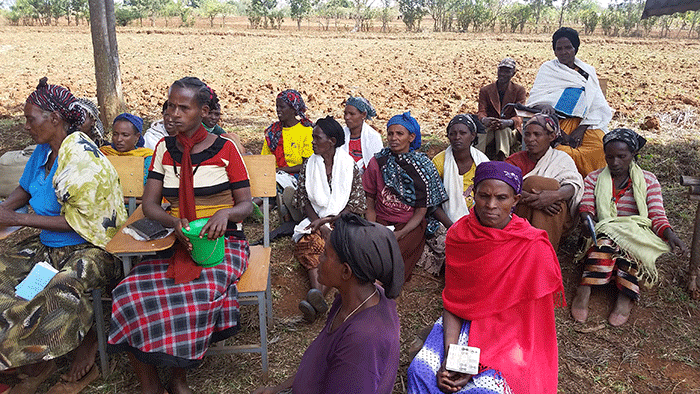Feature photo: Women at a savings group meeting in Meteka Mele, Boreda District, Southern Ethiopia.
For the last two or three decades, microfinance has been regarded as the panacea for poverty alleviation by donors and international development experts. There are concrete examples confirming that microfinance has uplifted thousands of people out of poverty, such as the families supported by Professor Yunus, founder of the Grameen Bank, after a devastating cyclone that hit Bangladesh in the 1970s. However, the focus has always been on microcredit. Microcredit can have a great impact on certain portion of communities but not all. Organizations operating in remote, rural places need to implement different financial inclusion strategies based on the crucial and strategic needs of communities they serve.
In remote, rural places, microsavings has the potential for wider coverage and impact in poverty than originally thought. The most important question to ask in this regard is, can people in extreme poverty save money? The answer definitely is yes but only if the beneficiaries believe that poverty is not a barrier to develop the habit of savings. Cathy Seco, Plan International’s Grants Manager in the Philippines, told Devex that “[t]here is a lot of behavioral and knowledge transformation and outlook and perspective [in saving money]. [It is in the] realization that no matter how poor you are, if you have the desire and when you look at and assess your circumstances, there is a way for you to save for the future.”
Similarly, Nuru believes that the poor can save money if they have access to affordable and accessible financial services that meet their needs and expectations. Nuru promotes savings habits by adapting services to the cultural practices of communities and introducing new skills trainings.
Nuru’s Financial Inclusion Program in both Ethiopia and Kenya is aimed at building savings habits by teaching basic financial management skills, helping farmers access financial services and increasing income opportunities with the ultimate goal of enabling farmers to cope with unexpected economic shocks.
In Kenya, Nuru helps community members to form savings clubs and learn basic financial management skills. Nuru also encourages members to regularly contribute to group savings accounts. Each member is contributing a minimum of $2.50 on a biweekly basis. The group savings can serve three purposes. First, members can use their savings for planned expenses, for example to pay for children’s school fees or for home improvements. Second, savings can be used to pay for immediate financial needs or bridge household cash flow gaps. Third, money can be used to cover for unexpected emergencies such as hospital bills or funeral expenses. In general, members can cover for mild to moderate economic shocks using savings accounts in about two to three years.
Loans are used as an incentive for savings. This means the group savings can be loaned to members who want lump sum money for investment in income generating activities or to cover emergencies. The fact that people know that they can borrow from their groups’ account at reasonable terms means they have the motivation to save more. The interest income from loans is distributed among savers based on their savings share. Higher interest income means farmers are further encouraged to increase savings.
In Ethiopia, the program goal is similar to the one in Kenya but the implementation strategy is different for two major reasons. First, financial services are extended through local cooperatives supported by Nuru Ethiopia. The availability of these cooperatives help Nuru farmers to receive integrated Agriculture and Financial Inclusion services at the same time. Working through cooperatives has the advantage of sustaining the program over the long term since cooperatives are member-owned and democratically managed local institutions, enabling them to provide cost-effective financial services to local members.
Second, the program focuses on mobilizing savings. However, given the severe poverty level, it is not possible to achieve a quicker impact. As a result, Nuru places special emphasis on income diversification through agro-based income generating activities (IGA). In this context, farmers may benefit from both increasing income and savings opportunities. In general, the goal in Ethiopia is changing savings habit even though farmers in the area are extremely poor and can’t save more than $0.20 cents per week. Loans are assumed to increase income and, by implication, savings.
Like in Kenya, saving and loan activities in Ethiopia are supported by financial literacy trainings. The program targets Nuru farmer households. The majority of members are women. Nuru believes that women are the architects of household financial resources but often excluded from the financial decision-making. By involving women in the program, Nuru believes that the household will have a strong supporting hand in increasing household income opportunities. The small IGA loans that Nuru facilitates will generate additional income for the household and increase women’s access to productive assets. How the Financial Inclusion Program will influence individual lives is something we will track in the coming months and years as we continuously monitor and evaluate impact.


